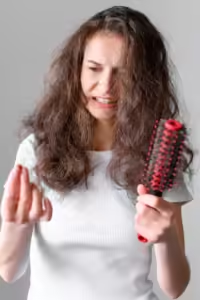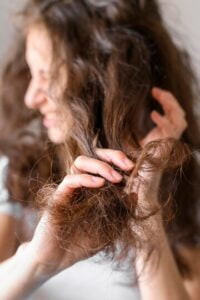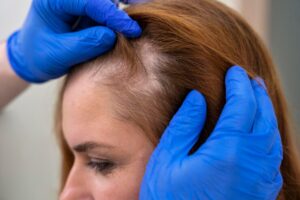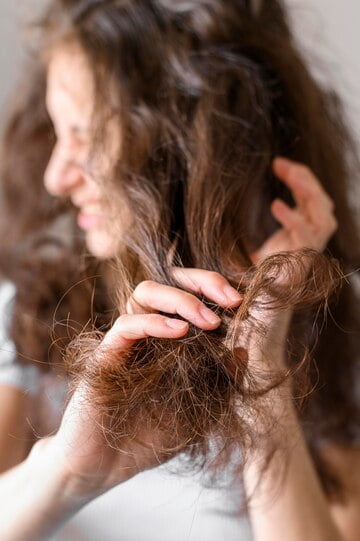Does creatine cause hair loss? Explore the connection between creatine supplementation and hair loss, backed by science, to find out whether using creatine can impact hair growth.

Introduction
Creatine is a popular supplement commonly used by athletes and fitness enthusiasts to enhance performance and build muscle mass. However, concerns have arisen regarding its potential to cause hair loss. This article aims to explore the relationship between creatine and hair loss, evaluating the scientific evidence, anecdotal experiences, and safe usage of creatine.
Understanding Creatine
What is creatine?
Creatine is a naturally occurring compound found in muscle cells that plays a vital role in producing energy during high-intensity exercise. The body synthesizes creatine in the liver, kidneys, and pancreas, and it is stored primarily in the muscles. Creatine supplementation aims to increase the available creatine in the body, potentially improving athletic performance and recovery.
The role of creatine in the body
Creatine is crucial for the production of adenosine triphosphate (ATP), the primary energy currency of cells. During high-intensity exercise, the body’s ATP stores are rapidly depleted. Creatine helps regenerate ATP more quickly, enabling sustained bursts of energy. As a result, it can support enhanced performance during short, intense workouts.
How creatine supplements work
Creatine supplements work by increasing the phosphocreatine stores in muscles, allowing for quicker replenishment of ATP. This can lead to improved power output, endurance, and recovery. These benefits make creatine one of the most popular and widely studied sports supplements.
The Science Behind Hair Growth
How hair growth works
Hair growth occurs in a cycle consisting of three phases: anagen (growth), catagen (transitional), and telogen (resting). During the anagen phase, hair actively grows from follicles. The length of this phase varies depending on factors such as genetics and overall health.
Factors affecting hair growth
Several factors influence hair growth, including genetics, hormones, nutrition, and stress levels. For instance, a balanced diet with sufficient nutrients is essential for healthy hair growth. Hormonal imbalances can also impact hair growth and may lead to hair loss in some cases.
Creatine and Hair Loss
Investigating the link between creatine and hair loss
Concerns about a potential link between creatine and hair loss have arisen, especially due to anecdotal reports. However, there is limited scientific evidence supporting this claim. Some speculate that creatine may affect hormonal balance, which could indirectly impact hair health.

Evidence from scientific studies
While there is no definitive proof that creatine directly causes hair loss, some studies suggest a potential link between creatine supplementation and an increase in the hormone dihydrotestosterone (DHT). Elevated DHT levels have been associated with hair loss, but the evidence is inconclusive. More research is needed to establish a clear connection.
Myths and Misconceptions
Common misconceptions about creatine and hair loss
Several myths surround creatine supplementation and its potential to cause hair loss. One common misconception is that creatine directly leads to hair loss. In reality, there is insufficient evidence to support this claim.
Disproving false claims
Many of the claims linking creatine to hair loss are based on anecdotal reports rather than scientific studies. These claims often overlook individual differences in genetics, hormonal balance, and overall health, which may play a role in hair loss.
Anecdotal Experiences
Personal experiences of creatine users
Some individuals who use creatine have reported experiencing hair loss, while others have not noticed any changes. Personal experiences vary widely, making it challenging to draw definitive conclusions.
How individual differences may play a role
Genetic factors, hormonal imbalances, and other individual differences can influence how creatine affects hair health. It is essential to consider these factors when evaluating the potential impact of creatine on hair loss.
Safe Usage of Creatine
Recommended dosages
To minimize potential risks, it is essential to follow recommended dosages when using creatine. The typical dosage is around 3-5 grams per day, depending on factors such as body weight and activity level.
Possible side effects
While creatine is generally safe, some individuals may experience side effects such as gastrointestinal discomfort, muscle cramps, and dehydration. Monitoring one’s response to creatine and adjusting dosage as needed can help manage these potential side effects.

Alternatives to Creatine
Natural alternatives for boosting performance
If you prefer to avoid creatine, several natural alternatives can enhance performance. These include beta-alanine, caffeine, and nitric oxide boosters. Each option offers its own set of benefits and potential drawbacks.
Comparing with creatine
While natural alternatives can be effective, creatine remains one of the most extensively researched and well-established supplements for performance enhancement. Comparing the effectiveness, safety, and potential side effects of different options can help you make an informed decision.
FAQs
Does creatine cause hair loss?
There is limited scientific evidence suggesting a direct link between creatine and hair loss. However, anecdotal reports vary, and individual differences may play a role in how creatine affects hair health.
Can creatine affect other aspects of hair health?
Creatine supplementation may indirectly impact hair health if it leads to hormonal changes. However, more research is needed to confirm any specific effects on hair growth or loss.
Who should avoid creatine supplementation?
Individuals with pre-existing kidney conditions or those who are pregnant or nursing should avoid creatine supplementation. It is always advisable to consult with a healthcare professional before starting any new supplement.
What are the safe alternatives to creatine?
Natural alternatives such as beta-alanine, caffeine, and nitric oxide boosters can enhance performance without the potential risks associated with creatine. Each alternative has its own set of benefits and potential side effects.
How can I mitigate the risk of hair loss while using creatine?
Monitoring your dosage and ensuring you stay within recommended limits can help mitigate the risk of hair loss while using creatine. Staying hydrated and maintaining a balanced diet can also support overall hair health.
What should I know before starting creatine?
Before starting creatine supplementation, it is essential to understand the recommended dosages, potential side effects, and your own health status. Consulting with a healthcare professional can help ensure safe and effective use.
Conclusion
In conclusion, while there is no definitive proof that creatine directly causes hair loss, some concerns remain due to potential hormonal changes. It is essential to follow recommended dosages and monitor individual responses to creatine supplementation. Staying informed and consulting with a healthcare professional can help ensure safe and effective use of creatine.

